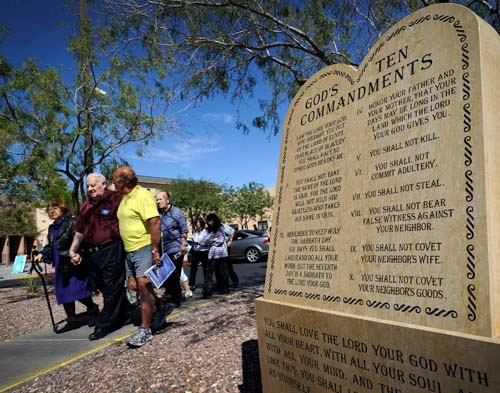Pastor was gambling addict

After months of speculation, the parishioners of St. Elizabeth Ann Seton Roman Catholic Church learned why their pastor had been placed on leave when he pleaded guilty Friday to stealing hundreds of thousands of dollars from the church.
Still one question remained: Why did he do it?
The answer: Monsignor Kevin McAuliffe is a compulsive gambler.
McAuliffe, 58, expressed his remorse for the theft through his attorney, Margaret Stanish.
“He has donated his life to serve his church and others,” an emotional Stanish said on Monday. “He, however, has a gambling addiction. He’s so very remorseful for the hurt he has caused to all who are precious to him.”
McAuliffe, the former vicar general for the Las Vegas Diocese, ranking second only to the bishop, pleaded guilty to three counts of mail fraud in federal court. The monsignor acknowledged stealing $650,000 from the Summerlin parish, including funds from the gift store, votive candles and church mission. His sentencing hearing is set for Jan. 6.
Stanish said McAuliffe wants to speak up, but she advised him to wait until after his case comes to a legal resolution.
“He said that if he can save one marriage, save one person from suicide, then it would be worth it to tell his story,” she said, noting that the pastor is not suicidal but is deeply ashamed.
Parishioners reached in the afternoon appeared willing to forgive, and one man credited McAuliffe with helping him with his own recovery.
That man, Robert Ragan, said he met McAuliffe in June in a treatment program.
“If Kevin wouldn’t have been in my group, I don’t know if I’d be doing as well as I am doing right now,” said the 27-year-old, who spent two months in treatment with the priest. “Everybody looked up to him. He had a lot of insight.”
Ragan said he had undergone prior treatment for his gambling addiction but didn’t take it seriously until McAuliffe became his friend and mentor through their recovery process. The monsignor gave him a Bible, Ragan said, and helped him to understand spirituality, which had been lacking in his life.
The pair bonded through their attraction to video poker, a common choice for gamblers seeking escape.
“I know that being a priest, it can be alienating. He was a lonely man,” Ragan said, noting that the priest became very emotional at times in treatment. “He didn’t have any friends, really, which I can relate to. Any pathological gambler can relate to always being isolated.”
The National Council on Problem Gambling reports 1 percent of U.S. adults are pathological gamblers. The addiction rate jumps to 6 percent for Nevada adults, according to the state’s council on the issue. Pathological gamblers are described as having broken the law or borrowed money to finance the habit, made failed attempts to quit and experienced depression or suicidal thoughts over losses.
Ragan said he hopes the public will understand that gambling addiction is a disease and come to forgive the pastor, whom he calls a dear friend.
“You can easily put on this mask because there’s no physical symptoms of it,” Ragan said. “But really, it’s eating you alive from the inside.”
Although parishioners initially were questioning how the monsignor spent the money, most were overwhelmingly sympathetic and supportive of their priest. They said learning he spent the money to feed a gambling addiction didn’t change that.
“My heart still goes out to him. It’s said that those who have no sin can cast the first stone,” said Gloria Devlin, who has attended St. Elizabeth’s for nearly 20 years. “Addiction is an illness. Sometimes we don’t understand addictions, and it’s easy just to say ‘just quit.’ But it’s not that easy for people with an addiction.”
Julie Root, a parishioner of about four years, said though she is shocked, learning McAuliffe has an addiction just makes her more sorrowful.
“It just makes him more human, very much like ourselves,” she said. “It makes me a little bit sadder knowing that he was going through something like this.”
Stanish said McAuliffe worries about St. Elizabeth and its parishioners.
“He knows he let them down,” she said. “Believe me, he knows he let them down.”
In court documents, McAuliffe agreed to pay $650,000 in restitution; where that money will come from is unknown. He also faces a maximum term of 60 years in prison and $750,000 in fines.
His attorney said six decades behind bars is unlikely. McAuliffe has no prior criminal record, and federal prosecutors have indicated they will seek a term on the lower end of federal sentencing guidelines, Stanish said. She said her client could face in the neighborhood of 33 months and might even get probation.
“He by no means is looking at mandatory imprisonment,” Stanish said, admitting that McAuliffe stealing such a vast sum over nearly a decade while in a position of trust does not bode well.
Then again, state courts last year took notice of the toll problem gambling has on Nevada families and created diversion programs for people who run afoul of the law to support their addiction. They stay out of jail, instead undergoing intense treatment to address the root cause of their addiction.
The federal government has no such program, Stanish said. Still, she will ask for compassion.
In the meantime, McAuliffe continues to receive treatment, she said.
Ragan, who said he spoke with the pastor last week, is optimistic about McAuliffe’s recovery.
“Kevin has a very strong recovery right now,” Ragan said. “He’s staying positive about everything. He’s in acceptance, which is a great place to be. All he can do is move forward and make amends.”
Contact reporter Jessica Fryman at jfryman@reviewjournal.com or 702-383-0264. Contact reporter Doug McMurdo at dmcmurdo@reviewjournal.com or 702-224-5512.